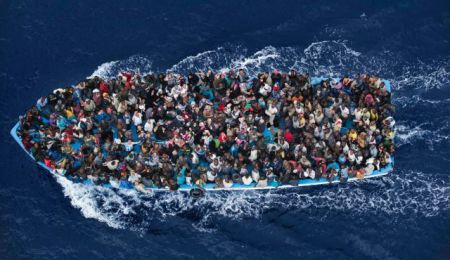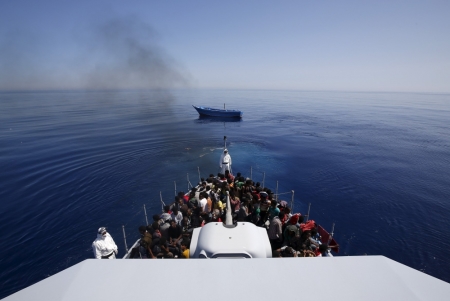ISIS Militants Are Making Millions Off of Human Smuggling Trade From Libya Into Europe, Report Finds

As conditions in the Middle East and Africa are causing thousands of people to seek ways to migrate into Europe, terrorist organizations like the Islamic State are profiting handsomely off of people that are trying to flee from the chaos these groups have helped cause, a recent report has found.
According to a report released Tuesday by The Global Initiative, terrorist groups including ISIS are benefiting from the lucrative human trafficking trade that illegally smuggles boatloads of people from the Libyan coast across the Mediterranean Sea into Europe.
The report estimates that the human trafficking trade generates between $255 million and $323 million each year.
"The value of this trade dwarfs any existing trafficking and smuggling businesses in the region, and has particularly strengthened groups with a terrorist agenda, including the Islamic State," the report states. "The brief concludes that given the level of illicit revenue it is currently possible to generate from the migrant flow, preventing Islamic State and coastal Libyan armed groups from becoming involved in or profiting from migrant smuggling should be of greater priority than attempting to cut off the long-established trans-Saharan trade routes passing through the Sahel toward Libya."
Although Syria is not even on the same continent as Libya, the report finds that most of the migrants being trafficked through Libya are Syrian refugees looking for ways to escape from the brutality of ISIS and the constant threat posed by the country's ongoing civil war. The report explains that Syrians are trafficked into Libya via Lebanon, Egypt or Sudan.

"Syrians account for the largest share of the migrants smuggled through Libya, though there are a rapidly growing number of sub-Saharan Africans now also migrating along these routes," the report explains.
Now that Syrians and more Africans are looking to make it into Europe, the report explains that it provides a great opportunity for terrorist groups and criminal networks to build both their revenue and authority.
"This growing business now provides what is possibly now the largest and most easily accessible threat finance opportunity for both organized crime networks and armed groups to purchase more arms, establish larger and more regular armies, and demand taxation," the report claims.
"Libya's fragmentation and insecurity is having a knock-on effect across Sahel and the Maghreb and this is creating copious safe havens for terrorist groups to operate with almost complete impunity," the report continues. "There seems to be no lack of opportunity for these groups to make alliances with, profit from or to tax the smuggling and trafficking trades perpetuated by the proliferating number of armed groups and criminal networks in the region."
Human trafficking has starkly increased in the last four years since the death of Libyan leader Muammar Gaddafi in 2011. The report states that in 2010, only 4,500 refugees were smuggled into Europe across the Mediterranean. In 2014, that estimate reached over 170,000, with 60 percent of them coming into Europe from Libya. Out of the 170,000 migrants, over 39,000 of them were from Syria, while over 33,000 of them hailed from Eritrea.
"Forced and illegal [but voluntary] migration has risen to become one of the largest sources of income in Libya, and a wide range of groups are profiting," the report states. "Since the Gadhafi era, militia groups in Libya have run detention centers for migrants, and continue to do so. There are numerous accounts of militia groups rounding up migrants and extorting their families for release, or selling migrants on to smugglers."
The report explains that the smugglers tend to charge about $800 to $1,000 to smuggle a migrant into Libya, then charge about $1,500 to $1,900 to smuggle them across the Mediterranean.
"Depending on the type of boat, one crossing may include several hundred migrants," the report states. "Once at sea, little regard is given for the migrants' final destination, as its assumed that they will be rescued at some point along the sea crossing."





















